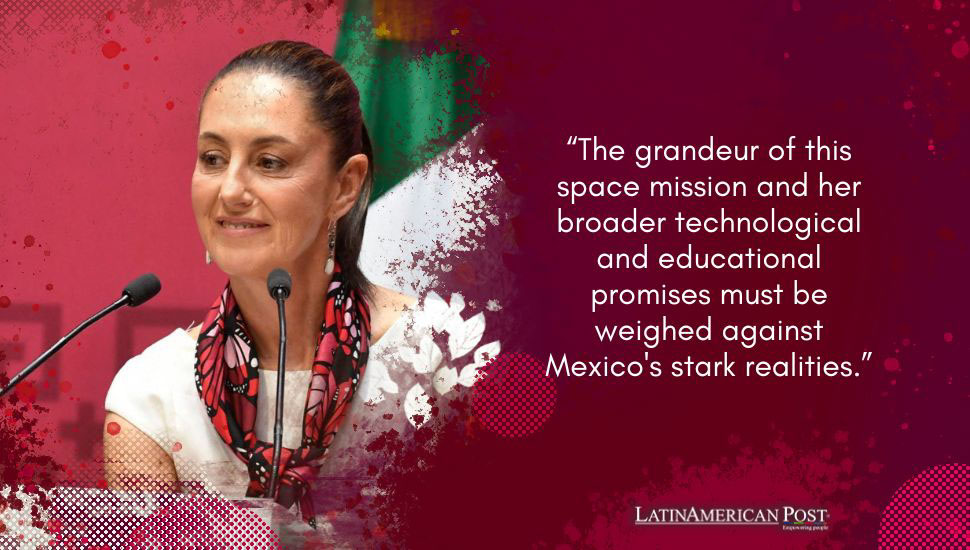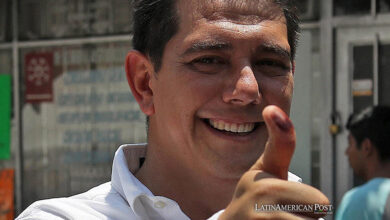Mexico’s Space Ambitions: A Leap Beyond Earthly Challenges?

Claudia Sheinbaum’s pledge to launch Mexico’s first government satellite and boost technological growth strikes a hopeful note, but skepticism looms over how these promises align with the nation’s pressing issues of violence, drug trafficking, poverty, and inequality.
Mexico’s political landscape is buzzing with anticipation as Claudia Sheinbaum, the ruling party’s presidential candidate, commits to an ambitious space endeavor alongside significant educational and technological advancements. Her vision, while inspiring, raises pertinent questions about the feasibility and prioritization of such projects amidst Mexico’s ongoing battles against drug trafficking, violence, poverty, and inequality.
National Pride vs. Stark Realities
Sheinbaum’s announcement, made during a National Polytechnic Institute (IPN) gathering to launch Mexico’s first state-operated satellite by 2027 and her call for support to actualize this lofty goal, taps into a sense of national pride and progress. However, the grandeur of this space mission and her broader technological and educational promises must be weighed against Mexico’s stark realities.
The candidate’s vision of making university education public and free, expanding higher education institutions, and increasing teaching positions has been met with enthusiasm, especially among educational communities. Yet, these pledges’ financial and logistical implications necessitate a closer examination, particularly when juxtaposed with Mexico’s urgent social issues.
While prioritizing technological development and innovation aligns with global progress, one must ponder whether these initiatives will divert attention and resources from critical areas such as public health, crime prevention, and social welfare. The promise of “12 Wellbeing Hubs” and mega projects like the Maya Train and Transoceanic Train, along with establishing 100 industrial parks, hints at a development model focused on infrastructural and industrial growth. However, the question remains: will these projects address the deep-seated issues of poverty and inequality that permeate many regions of Mexico?
Sheinbaum’s assurance to uphold and expand the legacies of President Andrés Manuel López Obrador, including significant infrastructure projects like the Felipe Ángeles International Airport, Dos Bocas Refinery, and Tulum International Airport, reflects a continuity of the current administration’s development trajectory. Yet, critics argue that such large-scale infrastructural endeavors have not sufficiently tackled the more immediate concerns of many Mexicans, such as job security, education quality, and healthcare accessibility.
Vague Outlines vs. Detailed Implementation
The proposed “largest simplification of procedures in Mexican history” and a national water development plan remain vaguely outlined, raising questions about their implementation and impact. Sheinbaum’s strategy for maintaining a substantial state role in electricity generation while promoting private investment and renewable energy balances state control and market participation. However, the specifics of these energy policies, especially in the context of sustainable and equitable national development, are yet to be fully disclosed.
In a nation where renewable energy and sustainable practices are increasingly vital, Sheinbaum’s emphasis on green hydrogen, solar, wind, hydroelectric, and geothermal power is commendable. Yet, the practicality of integrating such technologies into Mexico’s energy grid, alongside existing economic and infrastructural constraints, warrants a critical analysis.
The electoral context in which Sheinbaum operates is highly competitive, with opponents from established and emerging political coalitions challenging her narrative. These candidates’ contrasting platforms and priorities reflect the diverse perspectives and solutions proposed for Mexico’s array of challenges.
Vision vs. Pragmatism
As Sheinbaum leads the polls, her vision for a technologically advanced and educationally enriched Mexico captivates many. However, the broader picture of how these ambitious goals will coexist with the essential fight against corruption, crime, and inequality remains a topic of intense debate. The feasibility of simultaneously advancing in space technology and addressing terrestrial adversities is a problem that Mexican voters will ponder as they approach the polls.
Also read: Mexico Could Have Saved 224,000 Lives with Better Pandemic Management
In sum, while Claudia Sheinbaum’s promises herald a new era of technological and educational prosperity for Mexico, they must not overshadow the critical, immediate needs of combating violence and drug trafficking and alleviating poverty and inequality. The balance between aspirational projects and pragmatic solutions to longstanding societal issues will determine the country’s trajectory in the coming years. As Mexico stands at this crossroad, the path chosen will significantly influence not only its future in space exploration and technological innovation but also its progress in securing a more stable, equitable, and prosperous society for all its citizens.





